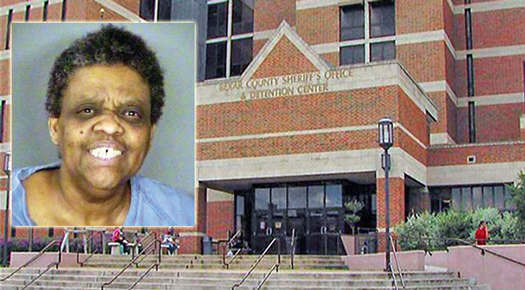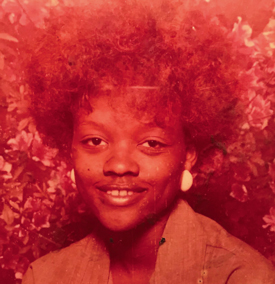‘I just want answers’ pleads son of Black woman who died in jail
By Brian E. Muhammad -Contributing Writer- | Last updated: Jan 8, 2019 - 10:47:31 PMWhat's your opinion on this article?
The family of Janice Dotson-Stephens, a 61-year-old mother and grandmother suffering with mental illness are perplexed and demanding answers about how she died in a San Antonio, Texas jail.

Janice Dotson-Stephens, 61 (r) Bexar County Jail
|
A medical examiner’s report listed Ms. Dotson-Stephens death as coronary heart disease complicated as a result of a schizoaffective disorder. However, a wrongful death suit filed by the family accuses Bexar County— where San Antonio is located; its pre-trial services; the sheriff’s department; and University Health System with negligence that led to Ms. Dotson-Stephens’ death. She died Dec. 14.
“I just want answers,” said Ronald Dotson, her son. “I just want to know what happened and why it happened.” Mr. Dotson told The Final Call, his mother lived with her condition for 40 years and dealt with the system just as long.
With her extensive history of mental illness, the family was used to her periodic bouts of instability. Mr. Dotson said his mother experiences paranoia and schizophrenias.
“Our mother walking off and disappearing and not contacting us for six months (and) at the most, a year at a time, is not unusual for us,” said Mr. Dotson.
Ms. Dotson-Stephens’ situation was well-known in the community and sometimes family acquaintances would call if they saw her in the streets. However, other times she would be in the state hospital. Family members would call various facilities trying to locate her. A call was placed to the jail in July during her most recent arrest, and they were told she was not there.
Bexar County police arrested her in mid-July on a misdemeanor trespassing charge. The incident stemmed directly from symptoms of her illness said her family. The police report of the arrest said a resident called police on Ms. Dotson-Stephens for committing a public disturbance at an apartment complex where her estranged husband lives. The report said she was angry and refused to give her name and leave the property, before being arrested. Afterward a court record shows she refused legal counsel and court dates. Her family says her mental state prevented her from making sound decisions. “It was obvious she was having a mental episode,” Mr. Dotson said.
With her condition, the family is baffled that she was languishing in jail for five months before passing away. Court records show a psychological evaluation wasn’t requested by a judge until over one month later on August 27.
But her saga worsened considering the fact Ms. Dotson-Stephen’s bail was only $300 and required a standard 10 percent of the bond which would have been $30 to be released, if anyone knew she was at the jail.
Bexar County Public Information Officer, Monica Ramos, refrained from answering questions from The Final Call about the tragedy while the legal case is in motion.
In a telephone interview with The Final Call, the family’s attorney Les Sachanowics said Ms. Dotson-Stephens became invisible because the system was indifferent about her condition.
“She was ignored to death,” said Atty. Sachanowics. “She got lost in the system,” he lamented.
“Unfortunately, in the system you become a number and the human face gets lost in that,” he added. “There should be safeguards in place in the system to monitor people. Something fell through the cracks.”
He said what must be remembered is “this was a human being,” who was connected to people who only have memories of her being their mother, grandmother and friend. Despite her periodic condition, she raised four children and has 10 grandchildren.

Janice Dotson-Stephens at younger age
|
The misdemeanor trespassing charge should have been limited to a maximum of three months in jail and a $2,000 fine. She was incarcerated past the time and there are questions if she received any of her needed medication.
“She had high blood pressure … cholesterol … she needed her psychiatric medication…the longer she sat down there, the worst her mental state,” Mr. Dotson pointed out. “They didn’t care,” he said.
Atty. Sachanowics explained the lawsuit alleges the county neglected to place Ms. Dotson-Stephens in the correct care for her mental state. By jailing her and keeping her there unnecessarily, it violated the Sandra Bland Act—the Texas woman jailed after a traffic stop in 2015 and found hanged in a jail cell.
Mental health advocates say it’s an uphill battle addressing mental illness. Many who suffer from mental illness are stigmatized, marginalized, and written off. This case is particularly sad, said one advocate because policies exist to divert people into treatment, rather than jail if they are having a mental health crisis.
“Bexar County is often held up as a model community in regard to jail diversion,” said Terri Mabrito, director of the National Alliance on Mental Illness—San Antonio. The group along with other advocacy groups have worked with education and training of county personnel in the area of mental illness and jail diversion.
Ms. Mabrito said the county has made “significant improvements” in the overall handling of the mentally ill getting care rather than jail. “Sadly … the process didn’t seem to work,” in this case, she said.
Ms. Dotson-Stephens’ saga is not unique, she is an unfortunate casualty of a global problem. According to the World Health Organization (WHO) one in four adults worldwide suffers from a mental disorder. Around 450 million people currently suffer from such conditions, placing mental disorders among the leading causes of illhealth and disability globally.
An October 2018 WHO report said although treatments are available, nearly two-thirds of people with a known mental disorder never seek help from a health professional. In many cases, stigma, discrimination and neglect prevent care and treatment from reaching people with mental disorders, said the group.
Where there is neglect, there is little or no understanding. Where there is no understanding, there is neglect, the report said.
Ms. Dotson-Stephens’ son said the lawsuit is not about money and it’s bigger than his mom and his family. It’s about the people going through a mental crisis who may not have anyone looking for them and may not be getting needed treatment.
“How many people are tied to that system undetected?” asked Mr. Dotson.
INSIDE STORIES AND REVIEWS
-
-
About Harriett ... and the Negro Hollywood Road Show
By Rabiah Muhammad, Guest Columnist » Full Story -
Skepticism greets Jay-Z, NFL talk of inspiring change
By Bryan 18X Crawford and Richard B. Muhammad The Final Call Newspaper @TheFinalCall » Full Story -
The painful problem of Black girls and suicide
By Charlene Muhammad -National Correspondent- » Full Story -
Exploitation of Innocence - Report: Perceptions, policies hurting Black girls
By Charlene Muhammad -National Correspondent- » Full Story -
Big Ballin: Big ideas fuel a father’s Big Baller Brand and brash business sense
By Bryan Crawford -Contributing Writer- » Full Story






 Click Here Stay Connected!
Click Here Stay Connected!








